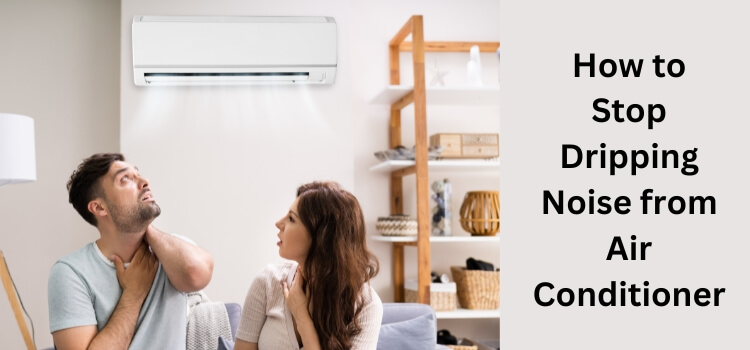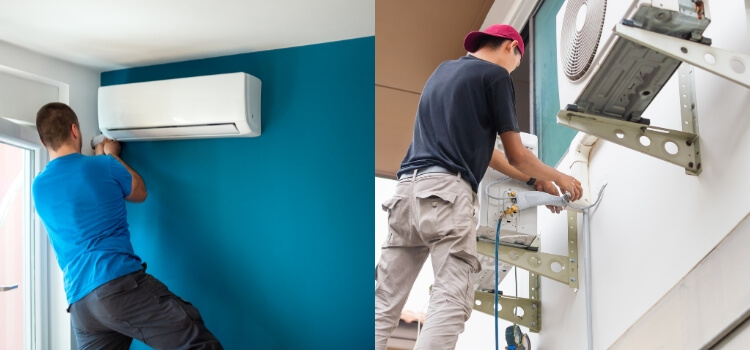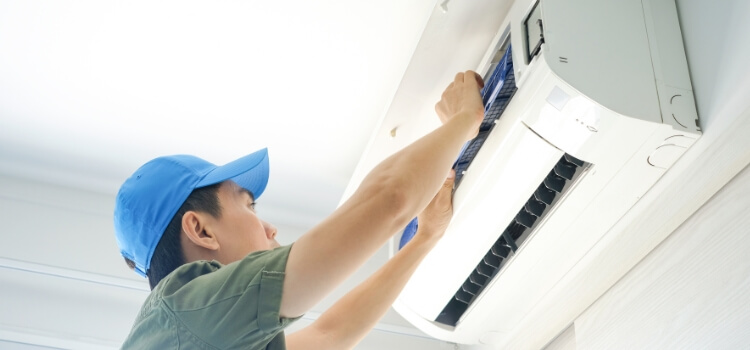As an Amazon Associate, I earn from qualifying purchases
If your air conditioner is making a leaking sound, make sure the condensate drain is clear, insulate the unit properly, and tie any loose parts. As bothersome as it is disruptive, the sound of an air conditioner leaking may be downright disturbing.
On the other hand, it can be a sign of more serious problems with the unit that need fixing right away. Stop the dripping sound of your air conditioner and get your house or workplace back to a calm place with these efficient ways discussed in this article.
Whether it’s a minor adjustment or a more complex repair, taking the necessary steps to address the issue can help you enjoy a quieter and more efficient cooling system.

Introduction To AC Dripping Noises
Is your air conditioner making a dripping noise? It could be caused by a clogged drain line or a dirty air filter. To stop the dripping noise, try cleaning the air filter and clearing the drain line. With regular maintenance, you can avoid this and keep your AC operating quietly.
Have you ever heard a dripping noise from your air conditioner and wondered what it could be? AC dripping noises are a common problem that many people face. They not only create an annoying sound but can also indicate a bigger issue that needs to be addressed. This article discusses the reasons for air conditioner dripping noises and why they should be addressed.
Common Causes Of Dripping
There are several reasons why your air conditioner might be making a dripping noise. Here are some of the most common causes:
- Dirty air filter: If the air filter is dirty, the evaporator coil may freeze up, which will make dripping sounds. It is essential to clean or replace your air filter regularly to avoid this issue.
- Clogged condensate drain line: When the condensate drain line gets clogged, it can prevent water from draining properly, resulting in annoying dripping noises. If not addressed, this can also lead to water damage.
- Low refrigerant levels: Low refrigerant levels may freeze the evaporator coil, causing dripping sounds. It is crucial to have a professional inspect your refrigerant levels and address any needed repairs.
- Damaged or dirty evaporator coil: A damaged or dirty evaporator coil can cause water to drip onto the floor, creating a dripping noise.
Why Silence Is Essential
Ignoring dripping noises can lead to bigger problems down the road. A broken evaporator coil or clogged condensate drain line may result in expensive water damage repair costs. Refrigerant levels that are too low might also make your air conditioner work harder, which raises your energy costs. Addressing dripping noises as soon as possible can save you time and money in the long run.
If you hear dripping noises coming from your air conditioner, don’t ignore them. To ensure the optimal performance and prevent further damage to your air conditioner, it is important to address the issue at hand.
Identifying The Source Of The Drip
To stop your air conditioner’s dripping noise, start by identifying the source of the drip. Check for any clogs or leaks in the condensate drain line and make sure the drain pan is not overflowing. Make sure these parts are clean and free of dirt to stop the leaking sound and keep your air conditioner running efficiently.
Inspection Techniques
Identifying the source of the drip from your air conditioner is crucial in resolving the issue. Here are some simple inspection techniques to help you pinpoint the problem:
Tools You’ll Need
To effectively identify the source of the dripping noise from your air conditioner, you will need the following tools:
- Flashlight
- Screwdriver
- Towels
- Cleaning solution
- Gloves
- Safety goggles
Remember to turn off the air conditioner before starting the inspection process.
Quick Fixes You Can Try Immediately
Dripping noises from your air conditioner may be both unpleasant and worrying. Fortunately, there are simple remedies you can attempt right now to stop the leaking noise and restore peace and quiet to your house. Let’s explore these simple solutions that can help you address the issue without the need for professional assistance.
Adjusting The Thermostat
If your air conditioner is producing a dripping noise, it might be operating at a too low temperature. Check your thermostat to ensure it’s not set to a freezing temperature. Adjusting the thermostat to a slightly higher setting can reduce the condensation that leads to the dripping noise. This quick fix can often provide immediate relief from the sound of water dripping from your AC unit.
Checking The Drain Pan
The drain pan beneath your air conditioner serves the crucial function of collecting condensate and preventing it from causing water damage. Inspect the drain pan to ensure it’s not overflowing or damaged. If the pan is full, carefully empty it and clean out any debris that may be obstructing the drainage system. Keeping the drain pan clean and free from obstructions can often eliminate the dripping noise and restore your air conditioner to its peaceful operation.
Cleaning The Air Conditioner Components
Cleaning the air conditioner components is essential to prevent dripping noise and maintain the efficiency of your unit. Regular cleaning of the coils, fins, and filter may greatly lower the frequency of dripping noise, guaranteeing a peaceful and cosy atmosphere in the home.
Filter Maintenance
Regularly cleaning and changing the air filter is critical for avoiding dust and debris from building in the air conditioner. A blocked filter may reduce airflow, resulting in condensation and dripping sounds. Keep in mind to inspect the filter once a month and to clean or replace it as necessary. This will guarantee that your air conditioner operates at peak efficiency and that the airflow is not impeded.
Coil And Fins Care
Check to see if dirt and other debris have built up on the evaporator and condenser coils. Use a soft brush or hoover tool to gently remove buildup.Make sure to use a fin comb to straighten out any bent fins. This will ensure that air can move properly and keep everything running smoothly. Regular maintenance of coils and fins can prevent condensation and dripping noise, improving the overall functioning of the air conditioner.
Unclogging The Ac Drain Line
When it comes to your air conditioner, a dripping noise can be a major annoyance. One of the common causes of this issue is a clogged AC drain line. Unclogging the AC drain line is a crucial step in resolving the dripping noise and ensuring proper functionality of your air conditioner. By following a few simple steps, you can effectively clear the drain line and prevent future clogs.

Step-by-step Guide
Unclogging the AC drain line involves a series of steps that can be easily carried out with minimal tools and effort. This is a step-by-step instruction that will help you solve the problem and get your air conditioner working again.
- Locate the AC drain line and access point.
- Inspect the drain line for any visible clogs or blockages.
- Use a mixture of vinegar and hot water to flush out the drain line.
- Allow the solution to sit in the drain line for at least 30 minutes.
- Flush the drain line with clean water to remove any remaining debris.
- Verify that the water is flowing freely through the drain line.
Preventing Future Clogs
After unclogging the AC drain line, To avoid repeat clogs, it’s essential to take preventative steps. By following these easy steps, you can keep the drain line clean and stop problems from happening again.
- Regularly inspect and clean the AC drain line to remove any potential buildup.
- Install a drain line cleaning tablet to prevent algae and mold growth.
- Ensure proper insulation of the drain line to prevent condensation and buildup.
Insulating The Ac Ducts
Insulating the AC ducts can help to reduce or eliminate the dripping noise from your air conditioner. This process involves using insulation material to cover the ducts, preventing condensation and the subsequent dripping sound.
Materials Required
Before starting the insulation process, gather the following materials:
- Insulation material (such as foam or fiber glass)
- Duct tape
- Utility knife
- Measuring tape
- Safety goggles and gloves
Installation Process
Follow these steps to insulate the AC ducts:
- First, ensure the ducts are clean and dry.
- Measure the dimensions of the ducts to determine the amount of insulation needed.
- Cut the insulation material to the appropriate size using a utility knife.
- Wrap the insulation around the ducts and secure it in place using duct tape.
- Ensure there are no gaps or exposed areas where condensation could form.
- Inspect the insulation regularly to check for any signs of wear or damage.
Professional Solutions For Persistent Problems
Resolve the persistent issue of a dripping noise from your air conditioner with professional solutions. Stop the annoying sound by checking for loose parts and ensuring proper installation and maintenance. Seek expert help for a quiet and efficient cooling experience.
What To Expect During A Service Call
Addressing a dripping noise from your air conditioner can be challenging. For persistent problems, it’s best to seek professional solutions.
When To Call A Technician
- If the dripping noise persists despite DIY attempts, call a technician.
- Noticing water pooling around your unit is a sign to seek professional help.
What To Expect During A Service Call
- The technician will inspect your AC unit for leaks and blockages.
- They will clean the condensate line and ensure proper drainage.
- Any necessary repairs or part replacements will be promptly addressed.
Innovative Products To Reduce Ac Noise
Are you annoyed by your AC’s dripping noise? It can be incredibly frustrating, especially when you’re trying to relax or get some work done. Luckily, several innovative products can help reduce the noise coming from your AC unit.
Sound Dampening Add-ons
Sound dampening add-ons are an excellent way to reduce the noise coming from your air conditioner. These gadgets absorb sound waves to stop them from bouncing about your home. There are several different types of sound dampening add-ons available, including:
- Acoustic foam panels
- Sound blankets
- Sound curtains
Each of these products has its own unique benefits, so it’s essential to do your research and find the one that’s right for you.
Vibration Isolators
Vibration isolators are another effective way to reduce the noise coming from your air conditioner. These products are designed to absorb the vibrations that your AC unit produces, preventing them from traveling through the walls and floors of your home. There are several different types of vibration isolators available, including:
- Rubber pads
- Vibration mounts
- Spring isolators
Like sound dampening add-ons, each of these products has its own unique benefits. It’s essential to choose the one that’s right for your specific needs.

Maintaining Your Air Conditioner For Long-term Quiet
Prevent dripping noise from your air conditioner by checking and cleaning the condensate drain line regularly. Ensure proper insulation on the pipes to minimize condensation and use a level to adjust the unit for optimal drainage, keeping your air conditioner quiet for the long term.
Regular Service Schedule
- Regular professional servicing reduces wear and tear on your unit.
- Experts recommend servicing your AC twice a year.
Diy Maintenance Tips
- Clean or replace filters every 1-2 months.
- Keep vents clear of obstruction.
- Inspect for leaks regularly.
- Taking care of your air conditioner ensures it remains quiet and efficient.
Enjoying Peace And Comfort
Achieving peace and comfort at home is essential for a relaxing atmosphere. To stop the dripping noise from your air conditioner, you can try cleaning the unit, checking the drain line, adjusting the thermostat, or calling a professional for maintenance.
Enjoy a noise-free, comfortable home environment with these simple solutions.
Recap Of Solutions
To recap, address loose parts, clean filters, check insulation, and level the unit.
Final Thoughts On Ac Noise Reduction
Reducing AC noise ensures a peaceful environment for your comfort.
Implement these solutions for a noise-free air conditioner to enjoy a quiet home. Remember to address the issue promptly to maintain a serene atmosphere.
Frequently Asked Questions
The sound may be due to a clogged or misaligned condensate drain line. Regular maintenance can prevent this issue.
To stop a dripping sound, locate the source and tighten any loose fixtures. Use a wrench to secure pipe connections. If the sound persists, consider calling a plumber to fix the issue.
To stop your air conditioner from dripping condensation, check for clogged drainage pipes, clean the air filter, and ensure proper insulation around the unit. Regular maintenance and cleaning can prevent condensation buildup.
To prevent dripping noise, check for clogged filters, low refrigerant levels, or a faulty drain pan.
Sudden dripping noise may indicate a clogged condensate line, improper installation, or a damaged condensate pump.
Conclusion
Stopping a dripping noise from your air conditioner is manageable. Regular maintenance and troubleshooting can resolve the issue. Following the steps outlined in this blog post, you can enjoy a quieter and more comfortable indoor environment. Remember, a well-maintained AC system is key to peaceful living.
As an Amazon Associate, I earn from qualifying purchases
Leave a Reply